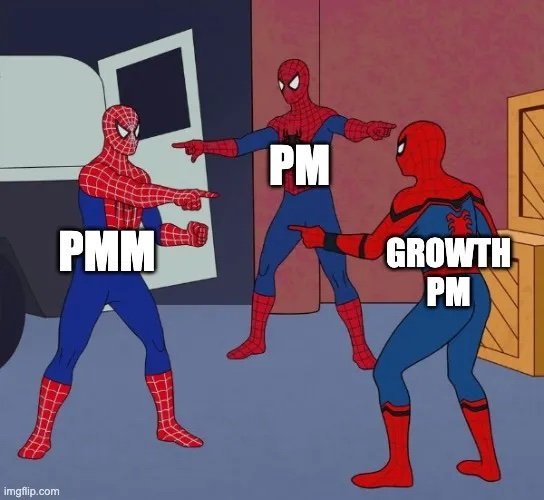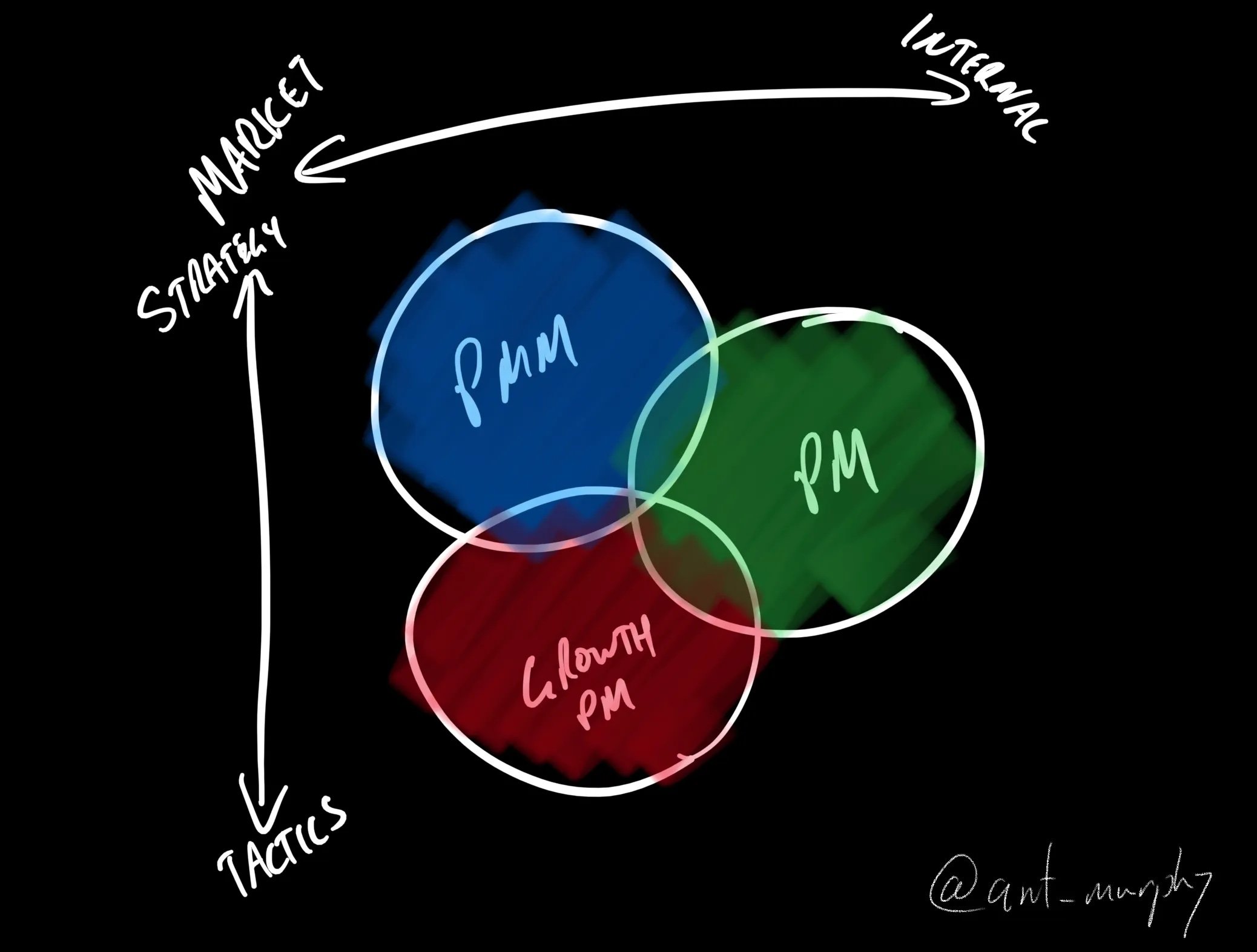Product Manager vs Product Marketing Manager vs Growth PM — What’s the Difference?
A question I get often is the difference between a Product Manager, Product Marketing Manager and a Growth PM.
Product Management can be confusing enough let alone trying to navigate the many different flavours.
However, understanding the nuances can be beneficial for those who might be more suited to these roles.
I’m not going to spend a whole lot of time in this article defining each of the roles (I’ll however have links to articles that dive deep into each role), rather what I want to focus on are the differences.
So where do the boundaries between Product Manager vs Product Marketing Manager vs Growth Product Manager lie?
Product Manager vs Product Marketing Manager
I recently saw this great thread from Lenny Rachitsky on Twitter where he asked the question about the boundaries between a Product Manager and a Product Marketing Manager.
The common theme was that a Product Manager worries about getting the product ‘out the door’, whereas a Product Marketing Manager worries more about getting the product ‘into the customer’s hands’.
Or as Evelyn Hartz put it:
“PMs own getting the cereal ON to the shelf (i.e. ingredients, nutrients, placement in relation to competitors, etc.) PMMs own getting you to take the box OFF the shelf (i.e. packaging, pricing, etc.)”
It’s important however to note that all this is in the context of organisations where they have both roles.
There are many organisations — e.g. early-stage startups — where they may only have Product Managers. In these cases, the Product Manager would be doing both roles of getting the ‘product on the shelf’ as well as ‘off the shelf’.
So to break this down a bit more, it can look something like this:
Product Manager:
Product Vision/Strategy/Roadmap
Product discovery & development
Product lifecycle management
Product Marketing Manager:
GTM strategy and execution
Sales enablement (B2B) and lead generation
Communicating the product to the market
Marketing campaigns
Where a Product Manager is more concerned with the overall direction of the product through defining its strategy, vision and roadmap. A Product Marketing Manager on the other hand would be more focused on taking the product to market — communicating its value proposition in a way that it attracts and retains customers.
“While all product teams aspire to create an elegant user experience and functionality that enables customers to intuitively “get it” after they try it, product marketers are focused on conveying the product’s value to the customer to engage, convert and retain them. Product marketers play a key role in driving awareness and trial as well as packaging the product to appeal to customers. They accomplish this by packaging a product’s features and functionality into messaging and positioning, pricing, and collateral.” — What Is Product Marketing? by Ada Chen Rekhi
But an important nuance is the fact that there is no definitive place where one role starts and the other finishes.
We know that building good products is key to selling them, and how we market, position and sell our products impact the way we build them. As such the two roles (at least how I’ve experienced them) are more of a partnership than mutually exclusive roles.
I liked the ‘Driver-Navigator’ analogy Brett Bryon used stating that “PM + PMM must be in lock-step throughout prod lifecycle, but who is sitting shotgun vs driving changes with phase.”
Not an exact science as I believe the best approach is to get in a room together and talk about who’s going to do what — I recommend doing one of these Roles and Responsibility workshops to align together on what this means as it will be different from person-to-person, company-to-company, product-to-product.
But an example of where both a Product Manager and Product Marketing Manager would be equally concerned with:
Market segmentation
TAM, OAM, SAM
Value Proposition
Personas
Pricing
Positioning
Go-to-market planning
etc
More on Product Managers vs Product Marketing Managers:
- Why Redgate has Product Marketing Managers and Product Managers
- Product Marketing Manager vs. Product Manager: Where Do You Draw the Line?
Product Manager vs Growth Product Manager
By now you should have a good idea of the difference between a Product Manager and a Product Marketing Manager — but what about if you have a Growth role in your company?
Growth Product Managers are often found in companies that deploy a product-led growth strategy.
There are two constructs I’ve seen with Growth Product Managers.
Growth Product Manager has a ‘Growth team’ with engineers and they make their own code changes and execute their own experiments.
Growth Product Manager doesn’t have a team, they partner with the PM to get their experiments prioritised and developed.
Regardless of what construct you have Growth Product Managers and Product Managers need to work closely together. I could easily copy-and-paste a lot of what I said in the first section about Product Marketing Manager vs Product Manager here in that regards — it's again, a partnership.
“Growth product managers are peers to traditional (or core) product managers. But rather than owning a specific product, the growth PM is focused on improving a specific business metric or commercial goal.” — The rise of the growth product manager
Growth Product Management is about growing a product through executing many rapid experiments in order to optimise product conversion — ever heard the term ‘Growth-hacking’.
“Growth Product Managers are responsible for leading experimentation along with data-driven decision-making in an organization to drive products to reach the next level of scale, impact, and profitability.” — Who are Growth Product Managers? by Ragini Vaid
Essentially Growth Product Managers use experimentation in order to find solutions that give them disproportional results in regards to a product’s growth.
“A growth hacker is a person whose true north is growth. Everything they do is scrutinized by its potential impact on scalable growth…”
“An effective growth hacker also needs to be disciplined to follow a growth hacking process of prioritizing ideas (their own and others in the company), testing the ideas, and being analytical enough to know which tested growth drivers to keep and which ones to cut. The faster this process can be repeated, the more likely they’ll find scalable, repeatable ways to grow the business.” — Sean Ellis
This means where a Product Manager owns the Product, a Growth Product Manager is focused on improving a specific part of the conversion funnel in relation to a specific business metric — like sales or retention.
Another key difference is the horizon that they focus on.
The nature of growth work generally means that Growth Product Managers are more short-term focused. They’re looking to run many rapid experiments to drive incremental improvements.
Whereas a Product Manager would be more longer-term focused, thinking about the overall product strategy, roadmap and general direction of the Product, whilst of course still balancing near-term customer and business needs.
But again, this is very much a partnership and in organisations where the Growth Product Manager doesn’t have their own team, as a Product Manager and Growth Product Manager you will need to work closely together to prioritise and execute these growth experiments.
More on Growth Product Manager vs Product Manager:
Product Marketing Manager vs Growth Product Manager
You’ve probably worked out by now that Product Marketing Managers typically focuses on launch, GTM and promotion type activities, whereas Growth Product Managers focus more on optimising product growth through experimentation.
Product Managers then focus on developing the core Product — its long term vision, strategy and managing it through the Product-lifecycle.
So what might it look like if you have all three of these roles?
The heavy emphasis on experimentation and growth makes Growth Product Managers differ from Product Marketing Managers in two ways:
they drive product changes either to execute their experiments or as a result of, and
Being focused on growth means that they’re often highly attuned to the more business side of the product — understanding costs, pricing and optimising the product towards specific business outcomes.
As a result, the business outcome that a Growth Product Manager may be optimising towards could be found anywhere in a Product’s conversion funnel. This differs from a Product Marketing Manager as they are generally more isolated to the beginning of the funnel where it touches the market.
Another difference comes in the team shape.
Since Growth Product Managers are often looking to make product changes they may have a development team with engineers who can make direct changes to the product.
In comparison, I seldom see Product Marketing Managers with their own team. Where I have, their composition are more design-heavy, aimed at building marketing and sales assets.
However, a commonality they both share is that this is not always the case. Often neither have a dedicated team, meaning that they need to influence others to achieve their goals.
Finally, where both roles exist, Growth Product Managers may work closely with Product Marketing Managers in order to run marketing related experiments (e.g. tweak marketing campaigns, marketing messaging, SEO, etc) to further “growth hack” the product.
As I mentioned at the beginning, there is a blurry space between these roles depending on your team shape and whether you have one, two or three of these roles.
For example, a Product Marketing Manager could very well be the one ‘growth hacking’ the product — by no means does a title stop this from happening. And in cases where an organisation may not have both a Growth and Product Marketing Manager they could very much look like one-and-the-same.
More on Growth Product Manager vs Product Marketing Manager:
In a nutshell…
Neither of these roles are cut-and-dry. And that’s part of the complexity of Product — it’s extremely contextual.
Depending on your context you don’t always have the luxury to have all three roles.
So where you just have a Product Manager you’d be expected to also do the marketing side of the role.
Similarly, I’ve managed a high growth product without a specific Growth role and as a Product Team, we were running rapid experiments to optimise our user funnel.
But where you have the luxury of these roles close alignment and continual communication between them are paramount.
If you’re a Product Manager, Product Marketing Manager, or Growth PM think of the other roles as your ‘partners in crime’. I go back to the ‘Driver-Navigator’ analogy Brett Bryon used when talking about Product Manager vs Product Marketing Manager.
This is where doing one of these Roles and Responsibility workshops is beneficial, so you can be clear on when they’re driving and your navigating, and visa-versa.
Whenever you're ready, I can help you in 4 ways:
Accelerate your impact and career with self-paced courses on specific topics such as Prioritisation, Stakeholder Management and many more.
1:1 Coaching/Mentoring: I help founders and product people overcome challenges through 1 hour virtual coaching sessions.
Private Workshops and Training: I run private workshops and training for product teams around the world. Get in touch to talk about your unique training needs to level up your team.



